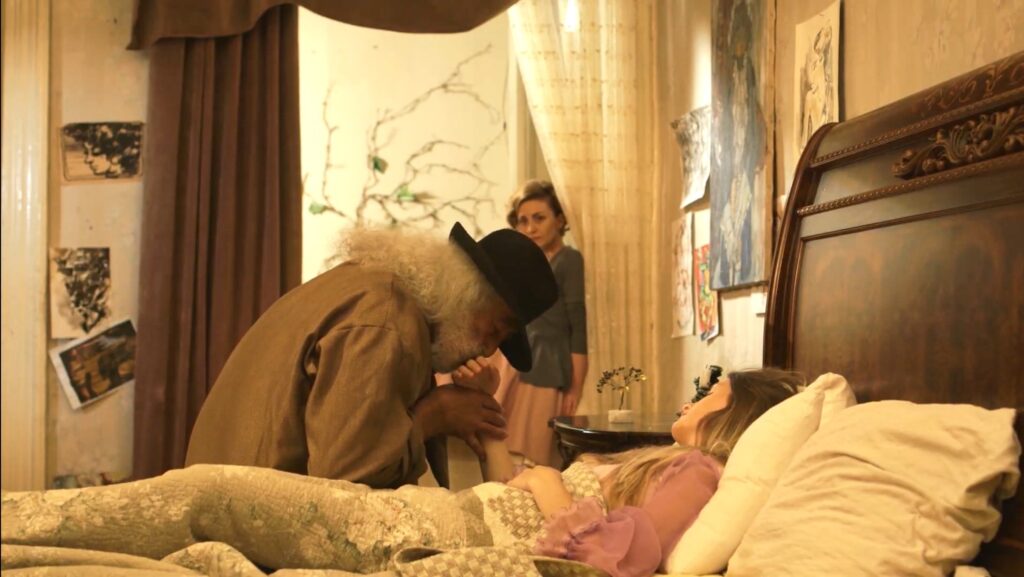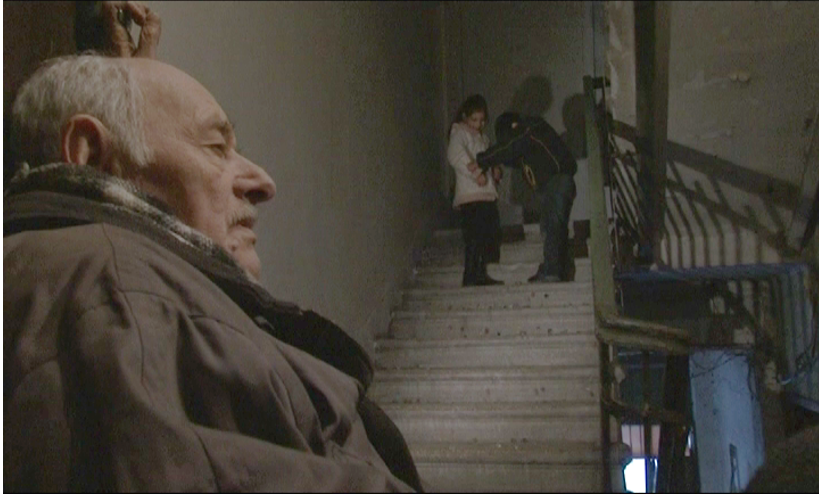True art brings not only aesthetic pleasure. It can sometimes save a person’s life and has the power to strengthen human relationships. People often lose faith and hope for survival and it is at this time when a person who is their savior appears in their lives and he often sacrifices himself to save someone else, as if it were his life’s duty.
Giorgi Chakhvadze’s student film, “The Last Leaf” (2018) is an adaptation of O. Henry’s story of the same name, which is not at all easy because the director and screenwriter are obliged not to grossly change the writer’s idea and, at the same time, show the viewer their own style.
First the director introduces us well the environment, society, and then the main characters: Sue (Tamuna Nikoladze), Joanna (Nino Kokhreidze), and Mr. Behrman (Guja Burduli). Then, in just a few shots, he brings the main characters closer together and soon, in a few minutes, we can see Joanna lying in bed, being examined by a doctor. Ivy leaves are visible and everything is clear. The only thing the audience is now eagerly awaiting from the director is a new, creative, and individualistic adaptation of a well-known story.
Apart from the fact that the action develops very quickly (because it is a short film), the film more or less follows O. Henry's story and the writer's main message is not lost in any part, although neither the acting nor the dialogues plays the main role in this. The fact that O. Henry’s esthetics is clearly present in the film is only due to the meticulously precise creation of the environment. Two things are of high quality here: the environment and the shots. The streets, the café, the house, each location is perfectly selected. Added to this are the shots and colors shot with camera professionalism (cameramen: Oto Gelashvili, Aleksandre Kvelashvili). The image is harmonious, the colors are well-matched.
From the very first minute of the film, a pleasant, aesthetic environment is felt, which is created, first of all, by the props and the location. Then the music (composer Zaza Marjanishvili) is noteworthy. Music is not an auxiliary element of the background but an active plot tool, which gives the film an overall aesthetic quality and naturally blends into the atmosphere from the very beginning.
Watching a film evokes positive, pleasant emotions in the viewer, but watching a music video or commercial can also be pleasant. In order for a film to be made and called perfect, every important and insignificant detail needs to be considered. What is rude and noticeable from the very first minute, is that there are no dialogues. It is obvious that the script has deviated from O. Henry's story, his dialogues and has taken the form of classic, Georgian banal dialogue, as in many other Georgian films.
The other and most important detail is the actors’ skill, although we do not see any acting skill in this film. Neither the dialogues are convincing, nor do the actors play naturally because they seem not to have mastered their roles, as if they were not able to fully understand the characters' personalities. Unfortunately, Tamuna Nikoladze’s and Nino Kokhreidze’s characters are full of unnaturalness and falsehood, they do not suit the corresponding heroines at all, which prevents the establishment of an emotional connection with the audience.
The excessive tragedy in the film is also irritating but it is still necessary in a small dose. In the critical scenes, at the climax, when Sue informs Joanna of Mr. Berhman’s death, there is no emotion from Sue except that the actress memorized the script well and did not understand its content. Both roles required a very deep understanding, which, unfortunately, we could not see. The actors did not seem to feel comfortable in this genre, which is obvious in their intonation. The characters required a more dynamic emotional range but the actors’ performance remained superficial. As for of Guja Burduli’s and Beso Baratashvili’s characters, it is difficult to assess their mastery, since neither of them had a very complex role. One thing is clear, Guja Burduli’s type was memorable and perfect for Mr. Berhman’s role.
Taking a famous story or novel as a primary source for a student film and working on it is not new, however, it is difficult to convey a story written by someone else a century ago without distorting the main message of the writer and at the same, time enriching it with something original. See the characters from your own perspective, the events that occur in the story, outline your style, etc.
This screen adaptation had the opportunity to convey each aspect of O. Henry’s story convincingly, but weak direction and lack of character development overshadow its potential. The goal of the film was probably more of a visual experiment than the creation of a valuable, authorial work.
Tinatin Asatiani






